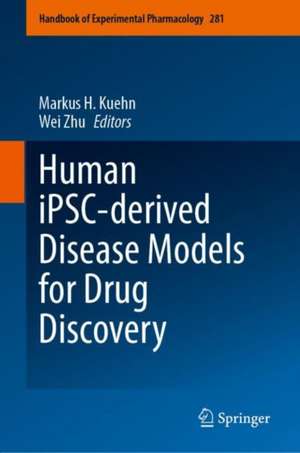Human iPSC-derived Disease Models for Drug Discovery: Handbook of Experimental Pharmacology, cartea 281
Editat de Markus H. Kuehn, Wei Zhuen Limba Engleză Hardback – 24 noi 2023
Din seria Handbook of Experimental Pharmacology
- 5%
 Preț: 3517.78 lei
Preț: 3517.78 lei - 5%
 Preț: 1425.97 lei
Preț: 1425.97 lei - 5%
 Preț: 1435.28 lei
Preț: 1435.28 lei - 5%
 Preț: 1430.52 lei
Preț: 1430.52 lei - 5%
 Preț: 1930.69 lei
Preț: 1930.69 lei - 5%
 Preț: 1922.47 lei
Preț: 1922.47 lei - 5%
 Preț: 1937.46 lei
Preț: 1937.46 lei - 5%
 Preț: 2117.58 lei
Preț: 2117.58 lei - 5%
 Preț: 2119.96 lei
Preț: 2119.96 lei - 5%
 Preț: 2117.38 lei
Preț: 2117.38 lei - 5%
 Preț: 1088.17 lei
Preț: 1088.17 lei - 5%
 Preț: 1098.27 lei
Preț: 1098.27 lei - 5%
 Preț: 1420.29 lei
Preț: 1420.29 lei - 5%
 Preț: 1104.84 lei
Preț: 1104.84 lei - 5%
 Preț: 1104.84 lei
Preț: 1104.84 lei - 5%
 Preț: 1108.14 lei
Preț: 1108.14 lei - 5%
 Preț: 1106.69 lei
Preț: 1106.69 lei - 5%
 Preț: 1105.77 lei
Preț: 1105.77 lei - 5%
 Preț: 1174.35 lei
Preț: 1174.35 lei - 5%
 Preț: 1432.50 lei
Preț: 1432.50 lei - 5%
 Preț: 408.48 lei
Preț: 408.48 lei - 5%
 Preț: 409.63 lei
Preț: 409.63 lei - 5%
 Preț: 539.90 lei
Preț: 539.90 lei - 5%
 Preț: 720.47 lei
Preț: 720.47 lei - 5%
 Preț: 733.09 lei
Preț: 733.09 lei - 5%
 Preț: 731.27 lei
Preț: 731.27 lei - 5%
 Preț: 746.43 lei
Preț: 746.43 lei - 5%
 Preț: 747.72 lei
Preț: 747.72 lei - 5%
 Preț: 725.24 lei
Preț: 725.24 lei - 5%
 Preț: 742.80 lei
Preț: 742.80 lei - 5%
 Preț: 393.23 lei
Preț: 393.23 lei - 5%
 Preț: 735.66 lei
Preț: 735.66 lei - 5%
 Preț: 728.33 lei
Preț: 728.33 lei - 5%
 Preț: 389.52 lei
Preț: 389.52 lei - 5%
 Preț: 730.71 lei
Preț: 730.71 lei - 5%
 Preț: 740.58 lei
Preț: 740.58 lei - 5%
 Preț: 730.19 lei
Preț: 730.19 lei - 5%
 Preț: 723.42 lei
Preț: 723.42 lei - 5%
 Preț: 731.27 lei
Preț: 731.27 lei - 5%
 Preț: 726.68 lei
Preț: 726.68 lei - 5%
 Preț: 3516.49 lei
Preț: 3516.49 lei - 5%
 Preț: 729.26 lei
Preț: 729.26 lei - 5%
 Preț: 737.11 lei
Preț: 737.11 lei - 5%
 Preț: 730.92 lei
Preț: 730.92 lei - 5%
 Preț: 738.78 lei
Preț: 738.78 lei - 5%
 Preț: 909.94 lei
Preț: 909.94 lei - 5%
 Preț: 720.10 lei
Preț: 720.10 lei - 5%
 Preț: 734.74 lei
Preț: 734.74 lei - 5%
 Preț: 727.80 lei
Preț: 727.80 lei
Preț: 900.72 lei
Preț vechi: 1185.16 lei
-24% Nou
Puncte Express: 1351
Preț estimativ în valută:
172.35€ • 187.80$ • 145.23£
172.35€ • 187.80$ • 145.23£
Carte tipărită la comandă
Livrare economică 19-25 aprilie
Preluare comenzi: 021 569.72.76
Specificații
ISBN-13: 9783031423482
ISBN-10: 3031423488
Pagini: 332
Ilustrații: VIII, 332 p. 100 illus., 30 illus. in color.
Dimensiuni: 155 x 235 mm
Ediția:1st ed. 2023
Editura: Springer International Publishing
Colecția Springer
Seria Handbook of Experimental Pharmacology
Locul publicării:Cham, Switzerland
ISBN-10: 3031423488
Pagini: 332
Ilustrații: VIII, 332 p. 100 illus., 30 illus. in color.
Dimensiuni: 155 x 235 mm
Ediția:1st ed. 2023
Editura: Springer International Publishing
Colecția Springer
Seria Handbook of Experimental Pharmacology
Locul publicării:Cham, Switzerland
Cuprins
Part 1 General considerations.- Human iPS for clinical applications and cellular products.- 3D-printed iPS disease models.- Part 2 CNS iPSC and organoids.- iPS-derived neurons and brain organoids from patients (brain).- iPS-derived RGCs (eye).- iPS-derived glia (brain).- iPSC to model blood-brain barrier endothelial cells.- Part 3 iPSC-derived nociceptive neurons.- IPSC-based peripheral nerve modeling.- Part 4 Non-neuronal specialized cell types.- iPSC-based drug screening of differentiated cardiomyocyte subtypes.- iPSC-based cardiac disease modeling: from cell to tissue.- iPSC-derived corneal endothelial cell.- iPSC-derived trabecular meshwork (eye).- iPSC for in vitro disease modeling of diabetes.
Caracteristici
Provides an exhaustive review of use of iPSC in pharmaceutics, iPSC-based modeling and materials science Broadens your understanding of iPSC to model diseases of cardiovascular system, nervous system and ophthalmology Presents iPSC-derived disease models that accelerate the development of pharmacologic treatments
